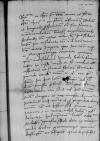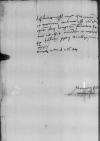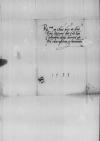Letter #3548
Mauritius FERBER to Ioannes DANTISCUSHeilsberg (Lidzbark), 1532-11-27
Manuscript sources:
Auxiliary sources:
Prints:
| ||||||||
Text & apparatus & commentary Plain text Text & commentary Text & apparatus Excerpts concerning Dantiscus' travels
Reverendissimo in Christo Patri et Domino, domino
Reverendissime in Christo Pater, domine amice et frater in Christo carissime ac plurimum observan(de) or observan(dissime)⌈observan(de)observan(de) or observan(dissime)⌉.
Salutem et longaevam prosperitatem cum sui sincera recommendatione.
Tametsi argumentum mihi scribendi non exstat, nolui tamen hunc subditum meum per
In novis nihil habemus, quod delectet, habuimus enim litteras a reverendissimo  BCz, 1595, p. 458 deperditas esse etc., quae ommia nota et notiora autumo esse Vestrae Reverendissimae Dominationi, quam Deus longaevam felicitare precor, mei, ut coepit, amantem et memorem.
BCz, 1595, p. 458 deperditas esse etc., quae ommia nota et notiora autumo esse Vestrae Reverendissimae Dominationi, quam Deus longaevam felicitare precor, mei, ut coepit, amantem et memorem.
Ex
Eiusdem Reverendissimae Dominationis Vestrae totus


